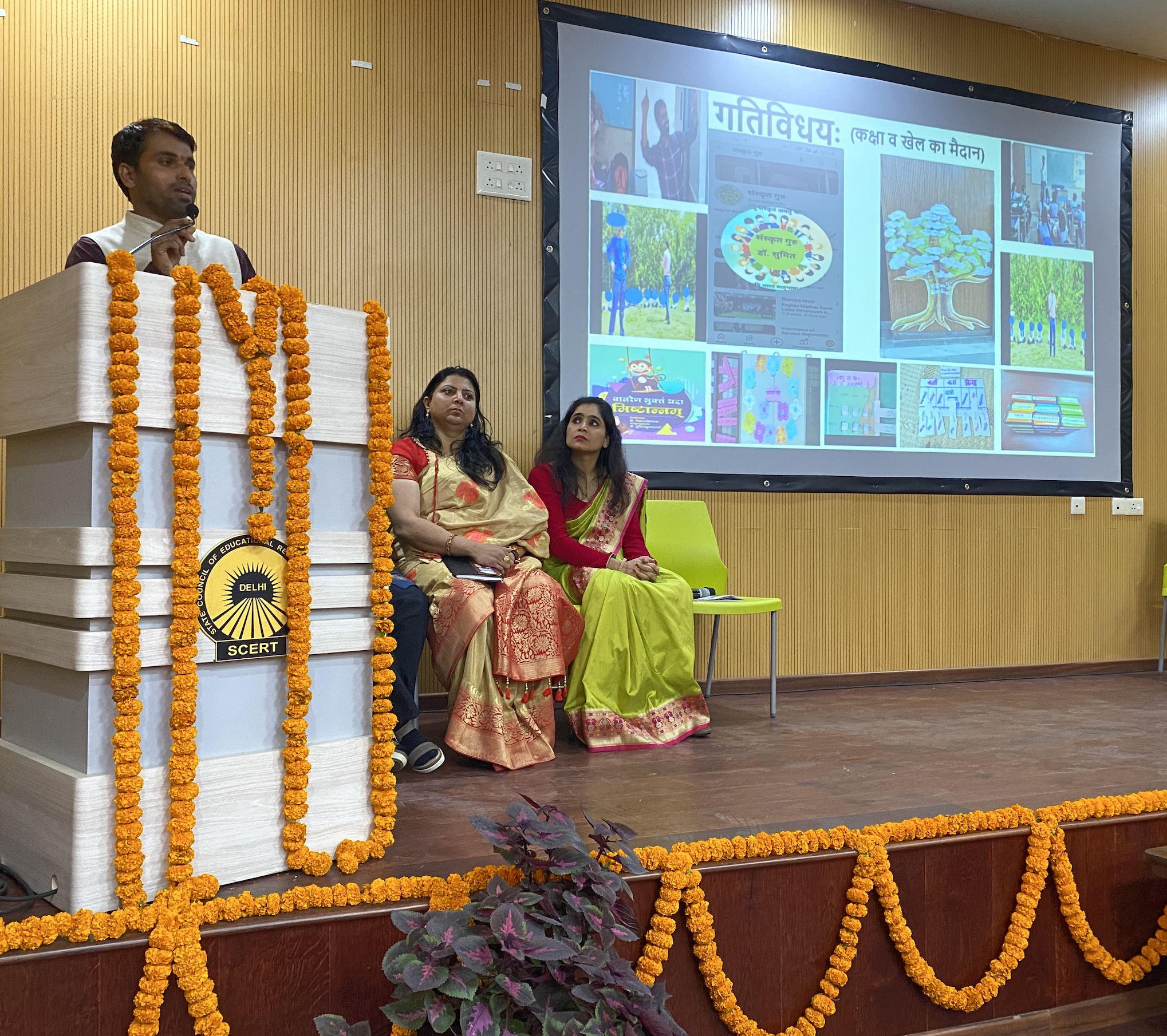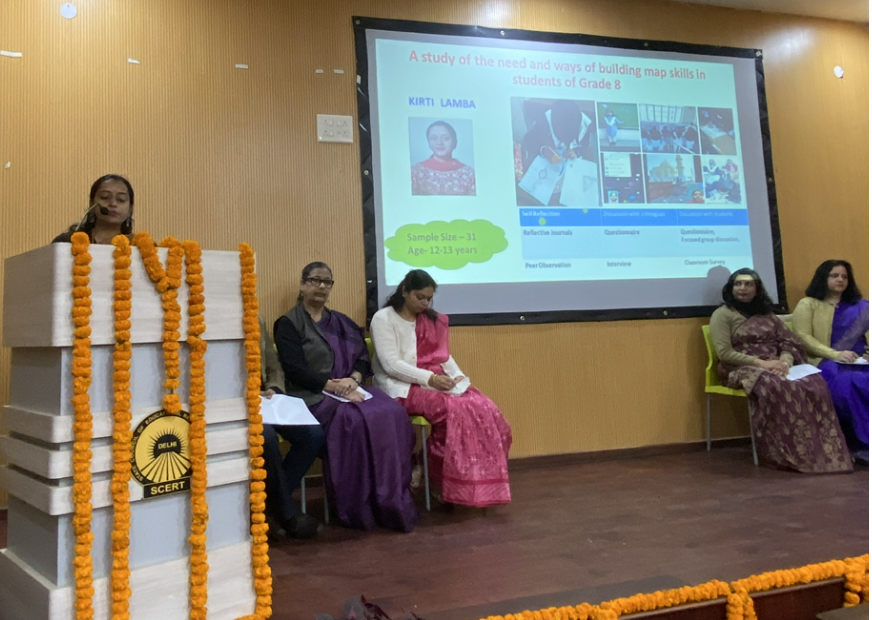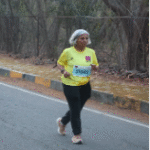
As part of the International Festival of Mentoring Teacher-Research in ELT (2024-25), a webinar on 14 December 2024 focused on ‘Mentoring teacher-research as a local educational authority initiative’, in Delhi, India. In this webinar, the mentors of the current cohort of teacher researchers presented reflective accounts of their mentoring journey from their own and their mentees’ perspectives. They also highlighted the different kinds of transition they had made: from a teacher to a researcher, researcher to a research mentor, private school to a public-school context and much more.
The context
In 2021, the State Council of Educational Research and Training (SCERT), the Delhi Government wing for teacher education, decided to invite teachers in their primary, middle and high schools to take up action research in their own contexts. It was probably the first time in India that a government department had initiated such a project. The project emanated from our past experience that while schools do give opportunities to reflect on and interrogate classroom issues, teachers often do not analyse or document their practices in a systematic way. There are various reasons for this: time constraints, lack of awareness, and the absence of a system that nurtures practitioner research. Moreover, although most teachers are introduced to the concept of teacher research during their preservice training, it seldom translates into real-world applications in school classrooms. This motivated the SCERT to initiate a programme that could help practising teachers to critically reflect on their day-to-day practices with a view to improving teaching and learning in the classroom. This, it was felt, would also contribute to their ongoing professional development as it would equip the teacher with the necessary tools and skills to observe, analyse, and evaluate their own classrooms.
Phase 1
The first phase (2021–22) saw 35 volunteer teachers enrol on this 8–10 month programme with mentors to support them throughout. These mentors were typically those who had been mentees/teacher-researchers on previous action research projects, mainly organised by the British Council. Therefore, these mentors had first-hand experience of carrying out at least one round of action research themselves. Initially there were some misconceptions about what classroom research actually involved, for example some teachers thought that this would give them the necessary skills to enrol on a PhD programme. Other similar issues were also clarified: the distinction between academic and practitioner research; problematising taken-for-granted practices; and asking deeper questi,ons about normal, everyday teaching practices. In spite of a few teacher drop-outs, the first cohort of Teacher Researchers (TRs) presented their work at a symposium organised in December 2023, with Richard Smith giving an in-person keynote talk. A key learning that caught our attention from these presentations was the aspect of collaboration among teachers from various primary, middle and secondary schools across different subject classrooms such as Sanskrit, home science, maths and English.


Rama Matthew and Richard Smith at the December 2023 symposium
Phase 2
Even as the next batch of teachers started their Action Research (AR) project, the global platform offered by MenTRnet allowed TRs from the first phase to present their learning at webinars. The next cohort of 35 teachers supported by 8–10 mentors didn’t have to deal with the ‘teething problems’ of the first batch. The kind and amount of time TRs needed to put into AR outside their regular teaching, the focus on process rather than on outcomes or the product, the value of reflection and of maintaining a reflective diary were all addressed quite effectively. This was also possible as the mentees from the first batch had become mentors along with the more senior mentors, and could clarify the questions that arose as one embarked on something outside the curriculum. The progress was quite apparent though subtle.

Teachers participating in the December 2024 Festival webinar
Work during Phases 1 and 2 involved a variety of activities:
Online and on-site training: TRs participated in training sessions that helped them to identify issues they wished to investigate further. Rama Mathew, a senior mentor, also participated, sharing her experience from other regions such as Bangladesh and Sierra Leone.
Mentoring sessions: Teachers were grouped with mentors to support them in their AR projects.
WhatsApp group chats continued throughout within and across groups where they shared their ongoing work, challenges faced, and future plans.
Dissemination of research: Teachers and mentors shared their findings at national and international conferences and webinars.


Teachers presenting their classroom research
At the second MenTRnet webinar, mentors focused on their research journeys. Some very crucial points emerged from their presentations:
- As teachers engaged in identifying problems, designing and implementing strategies and observing changes, they realised that the value of AR lies in looking at the teaching-learning process afresh, critically.
- Collaboration among teachers of different subjects and grades across schools was another significant outcome.
- The emphasis changed from external validation to self-motivation. AR was not about getting a certificate or the school principal’s appreciation but about cultivating a genuine interest in exploring challenges and helping students to take responsibility for their learning. This shift in mindset was perhaps the most rewarding aspect of the journey.
Challenges and future plans
The sustainability of this initiative is dependent on the SCERT’s willingness to continue AR in iterative cycles to include teachers who are keen on bringing about evidence-based change in their classrooms in a systematic way. Given the tradition of short, expert-oriented teacher training programmes, the idea of an AR project that is essentially a longer-duration and TR-centred one will probably take time to take root in the system. Further, integrating a research approach with their regular teaching may seem like a small change, but actually it is a substantial one for many teachers. In an exam-oriented culture, covering the syllabus takes priority and teachers are often told to ‘complete the syllabus first and then do whatever they like’. What TRs are experiencing at individual levels will need to be shared and disseminated widely for it to get accepted by all the stakeholders. Meanwhile we’ll need to go through several iterations of AR so students and teachers experience its benefits first-hand and are convinced about its transformative capacity.
About the Author(s)

Rama Matthew
Rama Mathew is an ELT consultant and has over forty years’ experience as a teacher, teacher educator and a researcher in India (at the EFL University and Delhi University), Bangladesh and Sierra Leone. She has worked with teachers and researchers on CPD and language assessment projects. She has several publications and presentations to her credit. Her research interests include language assessment, teaching English to young learners, continuing professional development (CPD) of teachers, and multilingual education. She believes that doing teacher research is a very powerful way to keep oneself and ones' students motivated, and to figure out ways in which teaching and learning can be made meaningful to both. She won the British Council’s South Asia ELTON award for Outstanding Achievement in 2024. Anyone interested in joining her team in carrying out classroom research can contact her at [email protected]



I will be happy to join the Mentrnet team.
You are welcome – if you are involved in / interested in mentoring teachers to research their practice, please join from our home page – http://mentrnet.net – top right orange button!